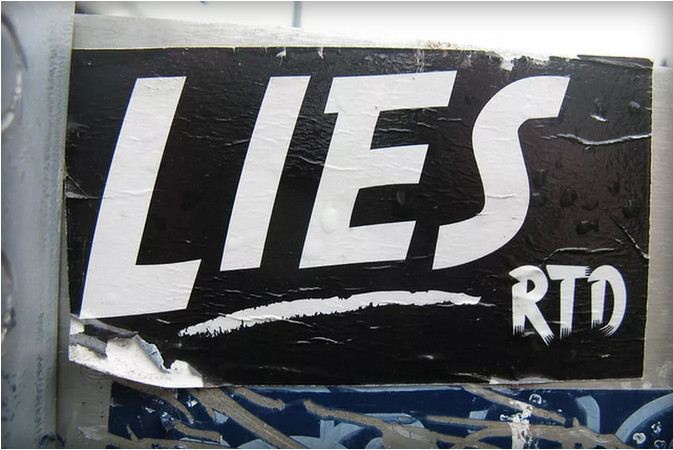Lies can become a habit when we do this many times?
If you lie once, your chances of continuing to lie for the second time will be higher. A new study has shown that the ability of a region to respond to the brain will become less and less when we cheat, and that will make us lie more.
Published the results of his research in Nature, psychologist Neil Garret from the University of London (UK) and his colleagues said they gave volunteers a game, a rule. If the player simply lied, they would have more and more money.
After conducting brain scans of these people, the team found that lying could lead to a more serious condition: people will lie more and more.When lying to you has become a habit, that's when your brain has become "saturated" with them.

When lying to you has become a habit, that's when your brain has become "saturated" with them.(Photo: Cat Branchman).
When we deceive someone, a component of the brain responsible for controlling emotions called amygdala - will be activated, and we often feel ashamed or loathe each time. Also, when we see an image of a cute dog, or a photo of someone who is upset, the amygdala will also react.
Previously, however, scientists have found that if we look at these images many times, the amygdala begins to react less. Meanwhile, Garret and his team wanted to know if this phenomenon happened with lying.
To do this, they conducted a small experiment like this: inviting adult volunteers to join a game, and these people didn't know each other. The requirement for them was to look at the picture of a glass jar, then tell the other person (tasked with assisting researchers, follow their control), see how many coins coin in it.
In the end, both will get paid, but sometimes the number will increase if they lie. The person who is tasked with looking at the image will lie to self-benefit, the opposite person or both, thanks to the rules that scientists make.
In the process of volunteers participating in this simple game, researchers will begin to perform brain scans some of them. Using functional magnetic resonance imaging (fMRI), scientists discovered in people who lie continuously, their amygdala will react less. In addition, the participants of the game will become more dishonest when they lie for their own benefit, while the amygdala also has little feedback.
Some people may even lie when the money they receive cannot increase. It is not because they have reasonably calculated after making a decision, but by becoming "rotten" with these lies.

Almonds play an important role in controlling emotions.(Photo: The Huffington Post).
"Reducing activity in the amygdala can predict how many times a person's dishonesty will increase," Garret said. Predicting future behavior although not really accurate for all individuals, but the general trend exists.
Even so, this study is not without restrictions. Scientists have given volunteers a specific game, and therefore, we cannot know what will happen to dishonest situations that happen in life. In addition, everything is done under the laboratory scale, so it is more or less under control.
And yet, brain scanning does not always give us absolute conclusions. Previously, scientists even showed that a dead fish still had brain activity when scanned with fMRI. In the study, only one area of the brain was analyzed, but it was not enough to evaluate the whole problem.
For his part, psychologist Garret said he believed that lying many times actually created a "path" in the brain. "We felt guilty the first time we intervened in the experiment, but it was used to the third time," he said.
- Forming a habit takes how long?
- What happens when you are lying?
- Unexpected facts about lies
- Disadvantages of lies
- Africa lies on a huge underground water tank
- The best lies for April Fool's Day
- The immeasurable harm of lying to the human brain
The 'phony' habit of geniuses in history
- Why do we lie?
- Hormone love makes people lie more blatantly
- 7 unexpected facts about the Sun.
- The more people create, the more they lie
 Green tea cleans teeth better than mouthwash?
Green tea cleans teeth better than mouthwash? Death kiss: This is why you should not let anyone kiss your baby's lips
Death kiss: This is why you should not let anyone kiss your baby's lips What is salmonellosis?
What is salmonellosis? Caution should be exercised when using aloe vera through eating and drinking
Caution should be exercised when using aloe vera through eating and drinking Does exercising our minds a lot help us burn excess calories?
Does exercising our minds a lot help us burn excess calories?  How did Egyptian mummies remove the brain from the body?
How did Egyptian mummies remove the brain from the body?  Shocking evidence that near-death experiences are real in people who have had cardiac arrest
Shocking evidence that near-death experiences are real in people who have had cardiac arrest  AI has been able to accurately reproduce more than 80% of images in the human brain.
AI has been able to accurately reproduce more than 80% of images in the human brain.  Neuralink tests controlling a robotic arm with thoughts
Neuralink tests controlling a robotic arm with thoughts  Elon Musk's ambition to merge humans with AI
Elon Musk's ambition to merge humans with AI 